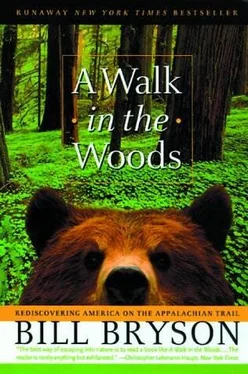Bill Bryson - A Walk In The Woods
Здесь есть возможность читать онлайн «Bill Bryson - A Walk In The Woods» весь текст электронной книги совершенно бесплатно (целиком полную версию без сокращений). В некоторых случаях можно слушать аудио, скачать через торрент в формате fb2 и присутствует краткое содержание. Жанр: Современная проза, на английском языке. Описание произведения, (предисловие) а так же отзывы посетителей доступны на портале библиотеки ЛибКат.
- Название:A Walk In The Woods
- Автор:
- Жанр:
- Год:неизвестен
- ISBN:нет данных
- Рейтинг книги:4 / 5. Голосов: 1
-
Избранное:Добавить в избранное
- Отзывы:
-
Ваша оценка:
- 80
- 1
- 2
- 3
- 4
- 5
A Walk In The Woods: краткое содержание, описание и аннотация
Предлагаем к чтению аннотацию, описание, краткое содержание или предисловие (зависит от того, что написал сам автор книги «A Walk In The Woods»). Если вы не нашли необходимую информацию о книге — напишите в комментариях, мы постараемся отыскать её.
A Walk In The Woods — читать онлайн бесплатно полную книгу (весь текст) целиком
Ниже представлен текст книги, разбитый по страницам. Система сохранения места последней прочитанной страницы, позволяет с удобством читать онлайн бесплатно книгу «A Walk In The Woods», без необходимости каждый раз заново искать на чём Вы остановились. Поставьте закладку, и сможете в любой момент перейти на страницу, на которой закончили чтение.
Интервал:
Закладка:
To ward off an aggressive black bear, Herrero suggests making a lot of noise, banging pots and pans together, throwing sticks and rocks, and “running at the bear.” (Yeah, right. You first, Professor.) On the other hand, he then adds judiciously, these tactics could “merely provoke the bear.” Well, thanks. Elsewhere he suggests that hikers should consider making noises from time to time-singing a song, say-to alert bears of their presence, since a startled bear is more likely to be an angry bear, but then a few pages later he cautions that “there may be danger in making noise,” since that can attract a hungry bear that might otherwise overlook you.
The fact is, no one can tell you what to do. Bears are unpredictable, and what works in one circumstance may not work in another. In 1973, two teenagers, Mark Seeley and Michael Whitten, were out for a hike in Yellowstone when they inadvertently crossed between a female black bear and her cubs. Nothing worries and antagonizes a female bear more than to have people between her and her brood. Furious, she turned and gave chase-despite the bear’s lolloping gait, it can move at up to thirty-five miles an hour-and the two boys scrambled up trees. The bear followed Whitten up his tree, clamped her mouth around his right foot, and slowly and patiently tugged him from his perch. (Is it me, or can you feel your fingernails scraping through the bark?) On the ground, she began mauling him extensively. In an attempt to distract the bear from his friend, Seeley shouted at it, whereupon the bear came and pulled him out of his tree, too. Both young men played dead-precisely the wrong thing to do, according to all the instruction manuals-and the bear left.
I won’t say I became obsessed by all this, but it did occupy my thoughts a great deal in the months while I waited for spring to come. My particular dread-the vivid possibility that left me staring at tree shadows on the bedroom ceiling night after night-was having to lie in a small tent, alone in an inky wilderness, listening to a foraging bear outside and wondering what its intentions were. I was especially riveted by an amateur photograph in Herrero’s book, taken late at night by a camper with a flash at a campground out West. The photograph caught four black bears as they puzzled over a suspended food bag. The bears were clearly startled but not remotely alarmed by the flash. It was not the size or demeanor of the bears that troubled me-they looked almost comically unaggressive, like four guys who had gotten a Frisbee caught up a tree-but their numbers. Up to that moment it had not occurred to me that bears might prowl in parties. What on earth would I do if four bears came into my camp? Why, I would die, of course. Literally shit myself lifeless. I would blow my sphincter out my backside like one of those unrolling paper streamers you get at children’s parties-I daresay it would even give a merry toot-and bleed to a messy death in my sleeping bag.
Herrero’s book was written in 1985. Since that time, according to an article in the New York Times, bear attacks in North America have increased by 25 percent. The Times article also noted that bears are far more likely to attack humans in the spring following a bad berry year. The previous year had been a very bad berry year. I didn’t like the feel of any of this.
Then there were all the problems and particular dangers of solitude. I still have my appendix, and any number of other organs that might burst or sputter in the empty wilds. What would I do then? What if I fell from a ledge and broke my back? What if I lost the trail in blizzard or fog, or was nipped by a venomous snake, or lost my footing on moss-slickened rocks crossing a stream and cracked my head a concussive blow? You could drown in three inches of water on your own. You could die from a twisted ankle. No, I didn’t like the feel of this at all.
At christmas, I put notes in lots of cards inviting people to come with me on the trail, if only part of the way. Nobody responded, of course. Then one day in late February, with departure nigh, I got a call. It was from an old school friend named Stephen Katz. Katz and I had grown up together in Iowa, but I had pretty well lost touch with him. Those of you-the six of you-who have read Neither Here nor There will recall Katz as my traveling companion around Europe in that tale of youthful adventure. In the twenty-five years since, I had run into him three or four times on visits home but hadn’t seen him otherwise. We had remained friends in a kind of theoretical sense, but our paths had diverged wildly.
“I’ve been hesitating to call,” he said slowly. He seemed to be searching for words. “But this Appalachian Trail deal-do you think maybe I could come with you?”
I couldn’t believe it. “You want to come with me?”
“If it’s a problem, I understand.”
“No,” I said. “No, no, no. You’re very welcome. You are extremely welcome.”
“Really?” He seemed to brighten.
“Of course.” I really could not believe it. I wasn’t going to have to walk alone. I did a little jig. I wasn’t going to have to walk alone. “I can’t tell you how welcome you would be.”
“Oh, great,” he said in a flood of relief, then added in a confessional tone, “I thought maybe you might not want me along.”
“Why ever not?”
“Because, you know, I still owe you $600 from Europe.”
“Hey, jeez, certainly not… You owe me $600?”
“I still intend to pay you back.”
“Hey,” I said. “Hey.” I couldn’t remember any $600. I had never released anyone from a debt of this magnitude before, and it took me a moment to get the words out. “Listen, it’s not a problem. Just come hiking with me. Are you sure you’re up for this?”
“Absolutely.”
“What kind of shape are you in?”
“Real good. I walk everywhere these days.”
“Really?” This is most unusual in America.
“Well, they repossessed my car, you see.”
“Ah.”
We talked a little more about this and that-his mother, my mother, Des Moines. I told him what little I knew about the trail and the wilderness life that awaited us. We settled that he would fly to New Hampshire the next Wednesday, we would spend two days making preparations, and then we’d hit the trail. For the first time in months I felt positively positive about this enterprise. Katz seemed remarkably upbeat, too, for someone who didn’t have to do this at all.
My last words to him were, “So, how are you with bears?”
“Hey, they haven’t got me yet!”
That’s the spirit, I thought. Good old Katz. Good old anyone with a pulse and a willingness to go walking with me. After he hung up, it occurred to me I hadn’t asked him why he wanted to come. Katz was the one person I knew on earth who might be on the run from guys with names like Julio and Mr. Big. Anyway, I didn’t care. I wasn’t going to have to walk alone.
I found my wife at the kitchen sink and told her the good news. She was more reserved in her enthusiasm than I had hoped.
“You’re going into the woods for weeks and weeks with a person you have barely seen for twenty-five years. Have you really thought this through?” (As if I have ever thought anything through.) “I thought you two ended up getting on each other’s nerves in Europe.”
“No.” This was not quite correct. “We started off on each other’s nerves. We ended up despising each other. But that was a long time ago.”
She gave me a look of some dubiety. “You have nothing in common.”
“We have everything in common. We’re forty-four years old. We’ll talk about hemorrhoids and lower back pain and how we can’t remember where we put anything, and the next night I’ll say, ‘Hey, did I tell you about my back problems?’ and he’ll say, ‘No, I don’t think so,’ and we’ll do it all over again. It’ll be great.”
Читать дальшеИнтервал:
Закладка:
Похожие книги на «A Walk In The Woods»
Представляем Вашему вниманию похожие книги на «A Walk In The Woods» списком для выбора. Мы отобрали схожую по названию и смыслу литературу в надежде предоставить читателям больше вариантов отыскать новые, интересные, ещё непрочитанные произведения.
Обсуждение, отзывы о книге «A Walk In The Woods» и просто собственные мнения читателей. Оставьте ваши комментарии, напишите, что Вы думаете о произведении, его смысле или главных героях. Укажите что конкретно понравилось, а что нет, и почему Вы так считаете.












